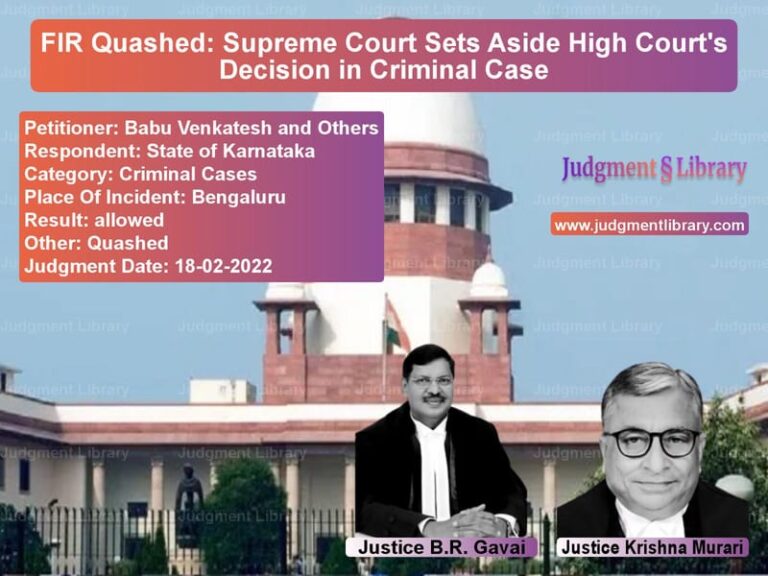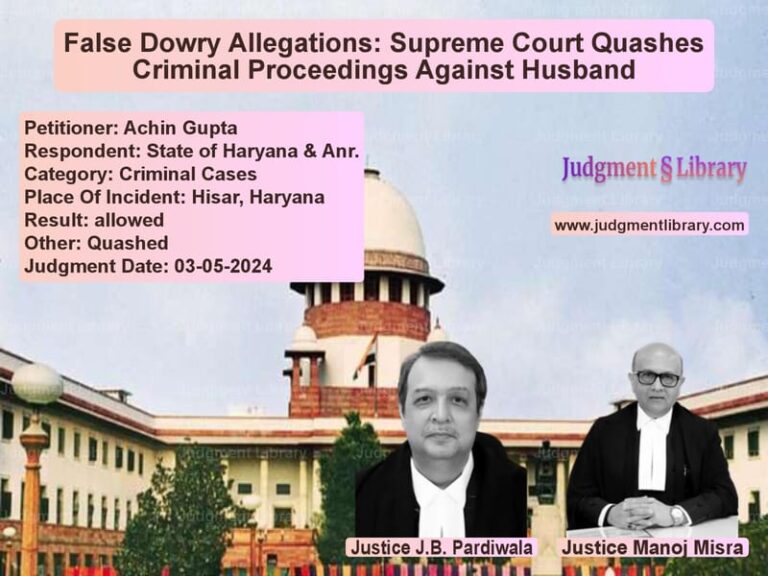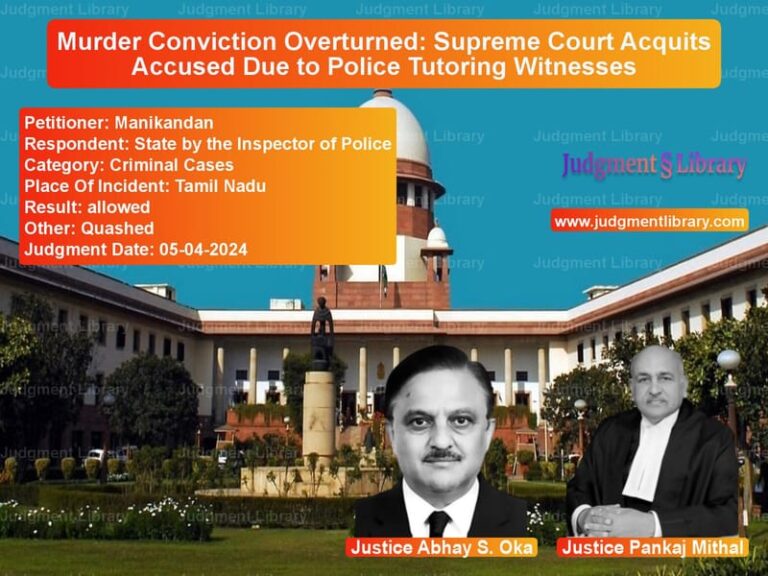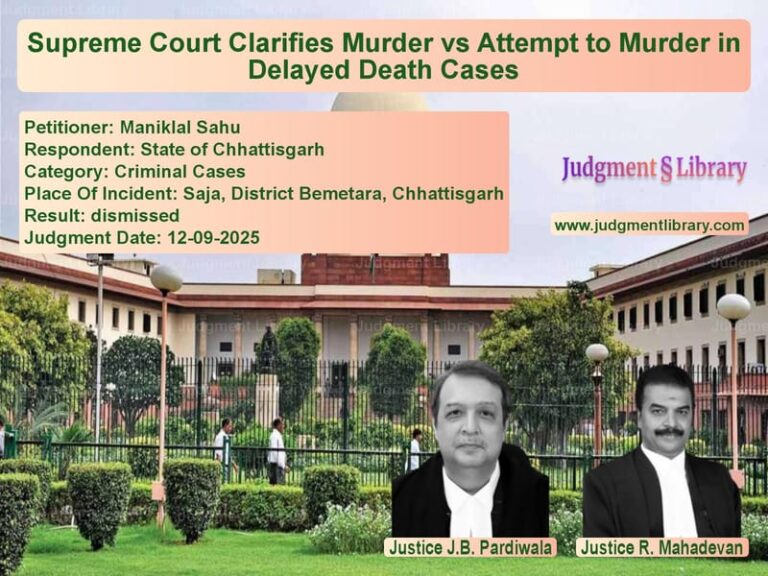Supreme Court Rules on Waiting List Candidates: No Automatic Right to Appointment
The Supreme Court of India, in the case of The State of Karnataka & Ors. vs. Smt. Bharathi S., addressed a crucial question regarding the rights of candidates whose names are included in an Additional List (wait list) of recruitment. The Court ruled that mere inclusion in a wait list does not create a right to appointment, and the decision to fill vacancies remains at the discretion of the State, subject to judicial review for arbitrariness.
Background of the Case
The case originated from a recruitment process conducted by the Department of Public Instructions, Government of Karnataka, for the post of Assistant Teacher in Government Primary Schools in Chikkaballapur District. The respondent, Smt. Bharathi S., applied for the position but was not included in the final selection list. However, an Additional List (wait list) was published on 29th February 2016, and she was the sole candidate included in it.
On 21st July 2016, one of the selected candidates informed the authorities of her unwillingness to join the post. Subsequently, the respondent, on 8th September 2016, requested that she be appointed in place of the candidate who had opted out. However, the State Government rejected her request on 17th February 2017, citing a government directive dated 11th April 2003, which stated that an Additional List remains valid only for six months from its publication or until all posts are filled, whichever occurs earlier.
Legal Proceedings
Tribunal and High Court Decisions
The respondent challenged the rejection before the Karnataka Administrative Tribunal, which upheld the government’s decision, ruling that the Additional List had expired on 28th August 2016. Dissatisfied with this ruling, she filed a writ petition in the Karnataka High Court.
The High Court, in its decision, overturned the Tribunal’s ruling, holding that:
- The State Government had failed to inform the respondent about the vacancy created by the candidate’s withdrawal.
- There were “lapses in filling up the vacancy,” which justified extending the validity of the Additional List beyond six months.
- The State was directed to appoint the respondent within three months.
Arguments Before the Supreme Court
Appellant’s Arguments (State of Karnataka)
The State contended that:
- The Additional List was governed by the directive dated 11th April 2003, which limited its validity to six months.
- The respondent applied for the post after the Additional List had expired and had no legal right to appointment.
- The High Court erred in directing the State to appoint the respondent in the absence of a mandatory rule requiring the filling of vacancies from the Additional List.
Respondent’s Arguments (Smt. Bharathi S.)
The respondent argued that:
- The directive of 11th April 2003 was merely an executive instruction and could not override the Karnataka Education Department Services (Department of Public Instructions) (Recruitment) Rules, 1967.
- The relevant rule (Entry 66) states that an Additional List remains valid until a subsequent recruitment notification is issued.
- The State acted unfairly by not informing her of the vacancy and by arbitrarily rejecting her request.
Supreme Court’s Observations
The Supreme Court examined the relevant provisions and past precedents to determine whether the High Court’s ruling was justified. The key findings of the Court were:
Validity of Additional List
- The directive dated 11th April 2003, which limits the validity of the Additional List to six months, was an executive instruction and not a binding statutory rule.
- However, the 1967 Recruitment Rules (as amended in 2001) did not impose a mandatory obligation on the State to fill vacancies from the Additional List.
- The mere inclusion of a candidate in a wait list does not create an automatic right to appointment.
Judicial Precedents
- The Court relied on previous rulings, including Shankarsan Dash v. Union of India (1991) 3 SCC 47, which held that “mere selection does not confer a vested right to appointment.”
- In Subha B. Nair v. State of Kerala (2008) 7 SCC 210, the Court held that an employer is not obligated to fill all vacancies unless required by a specific rule.
Discretion of the State
- The Court emphasized that the decision to fill vacancies from a wait list is within the government’s discretion.
- However, the government’s actions must not be arbitrary and should be subject to judicial review if discrimination or malafide intent is proven.
Final Judgment
Based on these findings, the Supreme Court ruled as follows:
- The High Court’s order directing the State to appoint the respondent was erroneous and is set aside.
- The State’s rejection of the respondent’s request was legally justified as the Additional List had expired.
- The discretion to fill vacancies from an Additional List lies with the State and cannot be enforced in the absence of a statutory obligation.
Key Takeaways
- No Automatic Right: Inclusion in a wait list does not grant an automatic right to appointment.
- Validity of Additional List: The duration of validity depends on government policies and recruitment rules.
- Discretion of the Government: The government retains discretion in filling vacancies, but it must act fairly and without arbitrariness.
- Judicial Review: Courts can intervene if the government’s decision is discriminatory or lacks a rational basis.
Conclusion
The Supreme Court’s ruling in this case sets an important precedent regarding the rights of candidates on a waiting list for government jobs. While it ensures that the government cannot act arbitrarily, it also upholds the principle that mere enlistment in a wait list does not confer an absolute right to appointment. The decision provides much-needed clarity for recruitment processes across various government departments.
Petitioner Name: State of Karnataka.Respondent Name: Smt. Bharathi S..Judgment By: Justice Dhananjaya Y Chandrachud, Justice Pamidighantam Sri Narasimha.Place Of Incident: Karnataka.Judgment Date: 19-05-2023.
Don’t miss out on the full details! Download the complete judgment in PDF format below and gain valuable insights instantly!
Download Judgment: state-of-karnataka-vs-smt.-bharathi-s.-supreme-court-of-india-judgment-dated-19-05-2023.pdf
Directly Download Judgment: Directly download this Judgment
See all petitions in Recruitment Policies
See all petitions in Public Sector Employees
See all petitions in Employment Disputes
See all petitions in Judgment by Dhananjaya Y Chandrachud
See all petitions in Judgment by P.S. Narasimha
See all petitions in allowed
See all petitions in supreme court of India judgments May 2023
See all petitions in 2023 judgments
See all posts in Service Matters Category
See all allowed petitions in Service Matters Category
See all Dismissed petitions in Service Matters Category
See all partially allowed petitions in Service Matters Category







